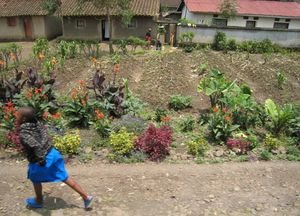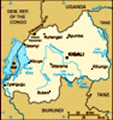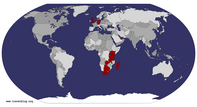Advertisement
Published: December 18th 2007

 Hurrying to school
Hurrying to school
past the gardens filled with veg and flowersNote from Marianne: This is going back in time a bit! I wrote this soon after we were in Rwanda, back in in September. Adam was supposed to write an entry about Kigali and the genocide memorials we visited there (not a comedy). And I wanted to write a more cheery entry about everyday Rwanda because we liked it so much. But Adam hasn't got round to writing his yet so (slightly out of context and very late) here is mine.
In Rwanda two things made an impression on us (apart from the gorilla slap): obviously the genocide memorials and the horror of everything we learned about the genocide. But also the everyday life and the people today, which are incredibly impressive and upbeat. We were so impressed with the people and the way they were living their lives and just all the mundane everyday stuff. We were impressed with Rwanda even without the context of the genocide, and with the knowledge of what happened 14 years ago, even more so.
So we want to write a bit about everyday Rwanda separately from all the genocide stuff, because it is such a contrast to all the depressing and

 even the verges have flowers
even the verges have flowers
and the ubiquitous eucalyptus treeshorrifying things people immediately think of when you mention Rwanda. So, no more G-word.
The first thing that hit us (or rather, didn’t) when we arrived in Kigali at the main bus station was the complete lack of hassle. Hardly anyone accosted us; no one grabbed our bags and demanded payment for carrying them 10 metres. We actually had to actively GO AND FIND a taxi. Ourselves. This is a skill we have nearly forgotten in Africa, so rarely have we had to exercise it.
The taxi driver dropped us off in the city centre and we notice - OH MY GOD - pavements!!! Traffic lights that cars stopped at! PEDESTRIAN CROSSINGS that (most of) the cars stopped for.
Whatever next? The boda boda taxis (motorbike taxis who carry one pillion passenger) not only wear helmets themselves, but they carry helmets for their passengers. Everywhere else in the countries we visited so far in Africa, the boda boda taxi drivers don’t wear helmets and the passengers certainly don’t.
Later that evening when it was dark and we went out to find dinner, there were STREETLIGHTS! That were working! So we could not only walk on pavements,
but they were well lit! It’s the first capital city in Africa we felt pretty safe walking around at night.
So Kigali appeared very developed and modern compared to all the other cities we’ve been in Africa. But also when we headed north for the gorillas and then west to Gisenyi and Lake Kivu we thought the same thing. It was apparent that in almost all of the villages we passed through, the quality of housing (more bricks, less mud huts), and the schools and hospitals appeared to be much better than we’ve seen anywhere else. The roads were certainly much better than Kenya (the worst so far) and Uganda - as well as a lack of potholes, there were novel things like white lines and crash barriers. So it really seemed to us that Rwanda is in a much better state development-wise than either Kenya or Uganda.
I should qualify this by saying that we drew this conclusion from the fairly superficial impressions of the obvious things we saw as tourists, mostly looking out of bus windows, in the relatively small area we passed through. And for sure, plenty of the places we passed though are POOR.
But the fact is, things looked to be in a better state than the other countries we went so far. I don’t know whether this is a direct result of the huge amounts of aid that Rwanda has received in the last 14 years as the developed world tries to relieve its guilty conscience for not acting to prevent the genocide. I know very little about the politics or economy of Rwanda. One thing that is true is that Rwanda is one of very few African countries that have actually received increasing amounts of financial aid in the last decade. Generally, the developed countries reduce the amount of aid donated when they see corrupt governments abusing the funds (which is the case in the majority of African countries). When the money is used well they increase their donations, as they have done in Rwanda. Like I say, I am fairly ill-informed when it comes to the politics or economics of Rwanda. For sure Kigame (the current president) is no angel, and (for example) Rwanda’s policies at the moment are a major contributing factor in the problems in Democratic Republic of Congo. And I don’t know much of the statistics in
terms of things like infant mortality, adult literacy, HIV infection rates etc which are often taken as indicators of the state of a developing country. We just want to make the point that in terms of buildings and basic infrastructure Rwanda appears to be well ahead of the other countries we’ve been to.
Another little thing which made a big impression - everyone in Rwanda has a garden, with flowers. Even some of the road side verges have flowers planted. I’m not talking about council sponsored “Rwanda in bloom” projects - I’m talking about small patches of dirt in front of mud huts in the middle of nowhere, with some neat rows of lilies and multicoloured foliage plants.
And what of the people? Again this is based on a very superficial impression; we only spent about 10 days in Rwanda and of course, almost all of the people we met are connected to the tourism industry in one way or another. But with all those caveats, our impression was of a very proud, hard working and forward-looking people. For this bit I’m going to have to mention the G-word.
Clearly we didn’t ask everyone we met “so,
are you a Tutsi or a Hutu?”. In fact we didn’t ask anyone (and for the record - you can’t tell by looking). But some people, when we talked about the genocide, volunteered the information that “I’m not a Hutu or a Tutsi, I’m a Rwandan”. It sounds rehearsed and clichéd when I write it here but it sounded genuine when people said it to us. The taxi driver (just a normal Kigali cabbie, not a special driver for tourists) who drove us to a couple of the genocide memorials was very proud of the way that the history of the genocide is being taught openly in schools. “We have to teach our kids honestly about the horrific things that happened so that they don’t take revenge, so that a new generation doesn’t grow up hating each other and the cycle continues”.
On Wednesday afternoon in Gisenyi we went to enquire about what time the buses left on Thursday morning to return to Kigali. The bus companies told us that no one works on Thursday morning, due to the “gacaca”. This is the kind of small scale community tribunal. It was a traditional justice system in the pre-colonial days

 Roadblocks...
Roadblocks...
...a fairly regular feature in Africa, but we saw more UN vehicles here than elsewhere (en route to DR Congo)which was reinstated in the aftermath of the genocide to help deal with the huge numbers of smaller scale offenders (especially kids). It takes the load off the big UN Rwanda War Crimes trials in Arusha (who try the worst offenders and instigators), and means that the lesser offenders were dealt with in the community where everyone was involved. These Gacaca “trials” are still going on, and every town has to set aside one half day per week when all the shops and offices close and the adults attend the gacaca hearings. We didn’t go to one, but the majority of the locals we spoke to told us that they were a useful process; in many places they have become less of a “trial” and more of a community counseling session, which brings everyone together and tries to reconcile some of the differences. Certainly no one we spoke to (shopkeepers, bus company workers etc) seemed to resent the half day’s business that they lost once a week - they mostly seemed to think it was a useful process.
When you drive around the country you often see groups of prisoners (many of them “minor” genocide perpetrators). They are all

 Armed roadblocks!
Armed roadblocks!
We all had to get off and queue - some passengers were searched - looking for Congolese refugees we thinkkitted out in slightly bizarre pink pyjama suits, and they are all working on road projects, litter collection etc. Seemed like a good system to us.
Everyday life is going on (to an observer anyway) in an incredibly normal way. The trendy young things in Kigali were all hurrying to work and grabbing coffees on the way, looking for all the world like the inhabitants of a European city. In the villages there was a lot less “sitting around” than we have seen elsewhere - people were busy in the fields or in their homes, carting big sacks of vegetables around on the buses to go to market.
Everyone was busy and friendly, even though (particularly in the villages) it was clear from their clothes that many people were seriously poor.
The kids in the villages in Rwanda were some of the nicest we have met. When we went for a walk around the villages near Kinigi (where the gorilla tracking goes from) we were mobbed by groups of kids. They wanted to chat and to practice their English. They loved having their picture taken (we’ve promised to send them copies). Very few asked us for anything,
and when they did it was usually a pen. One older boy had a stern word with the little ones asking for pens, and then explained to us that maybe when we sent the copies of the photos to the school we could throw in some second hand English text books if we could find any. But there was hardly any of the “gimme sweets!” “gimme money!” that we have had everywhere else.
When you chat to them for a bit longer, and ask about their families, you find that many of them have no parents and are living with grandparents, or at least lost one parent and a couple of siblings. There are a lot of orphans and many of them are living as street kids in the bigger cities.
So of course all is not rosy - how can it be after what happened? You see some of the physical scars when you walk around the towns and villages. I guess many more of the victims are behind closed doors - and the vast majority are in the many, huge, mass graves. You can’t even imagine what mental and emotional scars lie beneath this seeming “normality”,
both for the adults and the kids.
So there we go. A impression of everyday Rwanda, from two people who are not terribly well informed of all the politics and facts and figures, two people who visited briefly and looked around and spoke to people a bit.
We were just impressed that people were not self-pitying gibbering wrecks - I think I would be. They do a very good job of coming across as hard working, proud people thinking about the future of their country and working hard towards that future. And it seems to be working because (at least in terms of visible things) Rwanda appeared to be miles ahead of the other countries we’ve visited so far. It was also beautiful and full of friendly people. We can highly recommend it!
The pictures are mostly taken from a bus - seemed to be the best way to capture everyday life in a snapshot. So sorry that some are a bit blurry or wonky. The others are of the kids near Kinigi. They're nothing special or spectacular or exciting - they're just a selection of our pics which we thought captured a sense of everyday Rwanda,
it's people and countryside.
Advertisement
Tot: 0.112s; Tpl: 0.014s; cc: 15; qc: 68; dbt: 0.0647s; 1; m:domysql w:travelblog (10.17.0.13); sld: 1;
; mem: 1.3mb




















Laura
non-member comment
Has made my morning reading this. Your travels have been making me very envious, but its this kind of stuff that really matters. Whenever I read or hear about how the Rwandans have dealt with their recent history, I feel humbled. Hope you continue to have a fantastic trip.... looking forward to seeing you both next year. Laura x